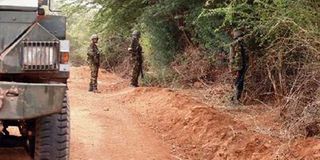The North Eastern region bleeds from the scars of terrorism

KDF soldiers on patrol. FILE PHOTO | NATION MEDIA GROUP.
For the past decade, Mandera, Wajir and Garissa counties have suffered from the effects of terrorism perpetrated by the al-Qaeda-linked al-Shabaab militants.
The militants operate from Somalia, a country that shares a long and porous border with the troubled north-eastern region.
Somalia has not known peace since 1991 when the government of President Siad Barre was overthrown.
In 1991, Barre's government collapsed when the Somali Rebellion successfully ousted him from power, leading to the Somali Civil War and a massive power vacuum in its wake.
Barre went into exile in Nigeria, where he died of a heart attack on his way to hospital in 1995.
The al-Shabaab group was formed in the mid-2000s as part of the Islamic Courts Union, and came to prominence during the 2006-2009 Somali War, when it presented itself as a vehicle for waging armed resistance against Ethiopia.
Before terrorism took centre stage, the North Eastern region of Kenya had long suffered from inter-clan clashes that left hundreds of residents dead and others displaced.
The region has suffered immeasurable consequences of terrorist attacks, including civilian and military casualties, ongoing psychological and emotional suffering of families directly affected, trauma and anxiety among Kenyans and affected nations.
Many lives have been lost in the region whenever the militants strike.
Mr Cosmas Mwania's brother Julius Kelly Mwania was abducted on March 11, 2020, leaving behind a wife and child.Kelly worked as a mechanic for a bus company operating between Nairobi and Mandera and was abducted while travelling to Mandera.
"We have never heard from our brother or of the government's efforts to rescue him. I don't know if he is still alive or has been killed," Mwania told Nation.Africa.
He said his brother's abduction by al-Shabaab militants continues to traumatise the family.
"The bus company where my brother worked has remained silent and even changed its name," he said.
On February 22, 2022, Jackson Kabuu, a medical officer at the Fino dispensary, was abducted by armed militants and has not been seen since.
The family has been living in agony trying to find their loved one.
In 2019, Cuban doctors Assel Herrera and Landy Rodriguez were abducted in Mandera.
It later emerged that they were released two years later.
The targeting of health workers in the region has led to the closure of some health facilities and the provision of few services in the absence of medical professionals.
In Mandera, health facilities around the Somali border, including Sheikh Barrow, Arabia, Fino, Lafey, Warankara and Borehole 11, Falana and Elram are understaffed.
In Wajir, health facilities in Tarbaj, Gherille, Diff, Kotulo, Konton and Khorar Kharaf are affected.
In Garissa, those in Hulogho, Ijara and part of Dadaab are also affected.
The mass exodus of teachers from the region in 2015, following a bus attack in November 2014, left a huge gap in schools.
Mandera currently needs at least 2,550 teachers for both primary and secondary schools.
Both Wajir and Garissa are also experiencing high levels of teacher shortages in schools.
The current wave of militant attacks in the region has created tension in schools and health facilities, with militants targeting security officers, teachers and medical staff in particular.
Tensions were reported to be high in Ficharo, Burmayo and throughout Wargadud division, where militants attacked Wargadud police station, killing two officers and a teacher who was living at the station.
In Iresuki, where the communications mast was destroyed, the health centre is closed due to the threat of terrorism, while Yetho Primary School is not fully operational.
Al-Shabaab has caused direct economic damage to property and lives.
When the militants attacked Wargadud police station, they took one police vehicle and burnt another.
A generator used to light the station was also damaged and several houses were destroyed.
At least four firearms, including two FRGs (Federal riot guns use to fire non-lethal munitions), and a total of 220 rounds of ammunition were lost to the militants.
Since 2013, much property has been damaged, including buildings and vehicles blown up by explosives.
Other vehicles have been hijacked by the militants in the region.
Many communication towers in the region have been damaged, leaving residents without communication.
"The most direct and measurable effect of terrorism is physical destruction. Terrorists destroy existing machinery, transport systems and other economic resources," said Mr Ali Omar, a resident of Garissa.
Mr Omar said limited government funding and support for local intelligence and security forces was seen as a major factor in the failure of the counter-terrorism campaign.
"These forces are ill-equipped and unable to match the tactics of the rapidly growing sophistication of the terrorist networks," he said.
During his tour of the region, Interior Cabinet Secretary Kithure Kindiki announced a Sh20 billion budget for the security sector to buy equipment.
Several roads in the region have become impassable, forcing even the government to declare them closed to public use.
In Mandera County, the Mandera-Arabia-Lafey-Elwak road was closed to public use in 2015.
Buses plying the Mandera-Rhamu-Elwak-Wajir road are banned from carrying non-locals due to terror threats in the region.
In Wajir County, roads in Tarbaj, Khorar Kharaf and Gherille areas are declared unsafe.
In Garissa, roads in Hulugho, Dadaab and Ijara have been declared unsafe due to terror threats.
Businesses have also been affected, with residents complaining of unreasonable taxes levied by the militants.
"We have to pay taxes to this group if we want to transport our goods from Kismayu to this region or even locally," a businessman in Wajir told Nation.Africa.
The militants have always collected zaka from pastoralists in the region during the months of July and August.
"They collect zaka from pastoralists and we have to give at least a camel or some goats to the militants during this period," our source said.




